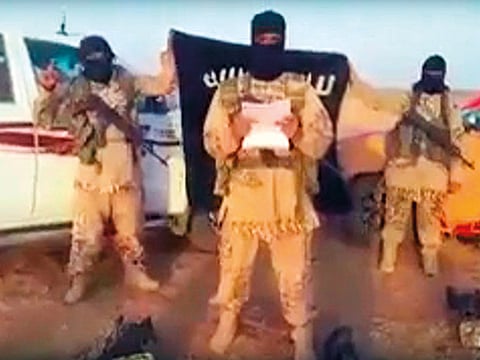Kuwait arrests suspects over Hezbollah intelligence links
13 suspects have been nabbed so far in a nationwide manhunt

Manama: Kuwait has arrested two new suspects on charges of intelligence links with Lebanese pro-Iran militia Hezbollah with the intent to carry out antagonistic acts in the northern Arabian Gulf country.
The arrests were part of a massive operation launched by the Kuwaiti authorities to re-arrest members of Al Abdali terror cell who were sentenced to prison terms in June, but have disappeared.
The two were among a group of eight suspects referred to the public prosecution and will be remanded in custody for 21 days pending further investigations.
One of the two suspects is a fugitive who was convicted in the 1980s in the case of explosions that hit the country.
He was pardoned in the early 1990s by the Emir following the liberation of Kuwait from the Iraqi occupation.
Sources told Kuwaiti daily Al Qabas that the public prosecution has summoned six Kuwaiti nationals reportedly involved in harbouring members of Al Abdali cell.
The security operations have so far netted 13 suspects on charges of being members of Hezbollah and the Iranian Revolutionary Guard and harbouring 12 fugitives, the sources added.
“Greater efforts will be exerted within the next hours to locate and arrest more suspects,” the sources said.
The Al Abdali case has been the hottest issue this summer following a final court verdict in June and news that 18 defendants have disappeared amid reports they had fled the country, a claim that was dismissed by the interior ministry.
The Al Abdali case emerged in the open on August 13, 2015, when Kuwait’s Interior Ministry said that it busted a terrorist cell and uncovered a large cache of arms, ammunitions and explosives hidden underground at a farm in Abdali. The cache contained 24 hand grenades, 65 guns, 56 RPGs and 144kg of bomb-making material.
On September 1, 2015, Kuwait’s public prosecution said 26 defendants, including one Iranian, would stand trial for the possession of weapons, ammunition and explosives and espionage for Iran and Hezbollah.
It said that 24 defendants faced charges of engaging in acts likely to undermine the unity and safety of Kuwait and of intelligence with Iran and Hezbollah.
However, the Iranian embassy on September 3 downplayed the significance of the terrorist cell and the charges of espionage, saying that the case was a domestic Kuwaiti issue pertaining mainly to the discovery of weapons and ammunitions.
However, the Kuwaiti cabinet voiced “deep indignation and condemnation over the heinous acts and grave charges” revealed by the indictment of 26 people for the illegal possession of arms and contacts with Iran and Hezbollah.
“The charges involve dimensions and risks that pose a threat to the nation’s security, sovereignty and stability, as well as to its unity and territorial integrity, particularly in light of the huge amounts of explosives, arms and ammunition seized by the security bodies last month, and the way they were hidden,” the cabinet said.
The cabinet stressed that it would never tolerate targeting or harming Kuwaiti citizens and expatriates and that all the concerned agencies would take the necessary measures to preserve security and safety in the country.
The trial opened on September 15, 2015, and the criminal court on January 12 ruled death sentences for the Iranian in absentia and for a Kuwaiti defendant. It also decided a life sentence for one suspect and prison terms for the others ranging from five to 15 years.
The verdicts were appealed and the Court of Appeals in July last year ruled that 15 members of the cell were not guilty in the case of espionage for Iran and Hezbollah.
In June, the Cassation Court, the highest court in the country, overturned the death sentence of one accused and commuted it to life in prison. It also cancelled the acquittal of 15 defendants and sentenced two to 15 years in prison, 15 to 10 years and three to five years.
In July, and following a report that some of the convicts disappeared on the day the Cassation Court issued its prison verdicts, the interior ministry said there was no evidence that the convicts had left the country and appealed for assistance from Kuwaitis and residents in locating them.
The ministry warned that anyone withholding information on the whereabouts of the convicts would face legal measures.
“We call on all citizens and residents to cooperate with security forces and provide any information they may have,” the statement said.
“All those who conceal any information on the convicts or are accomplices in helping them escape will face incarceration for two years and, or, a fine of up to KD2,000.”
The ministry published the pictures of the 16 convicts wanted by the police in an effort to help people identify and report them.
On July 20, Kuwait asked the Iranian embassy to reduce the number of its diplomats from 19 to four.
The diplomats, declared personae non gratae, were given 45 days to leave Kuwait.
The request was made in a protest letter to the Iranian diplomatic mission in Kuwait, asking for shutting down the cultural mission and the military bureau and announcing that all joint commissions between the two countries were suspended.


